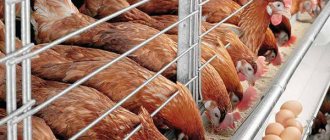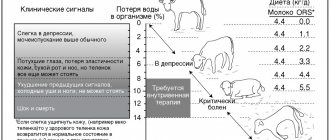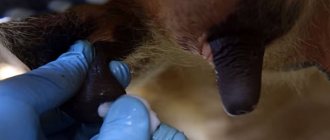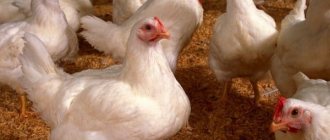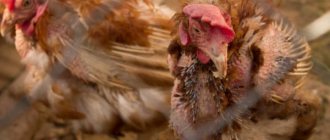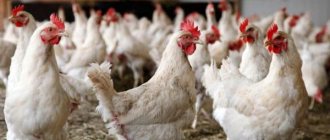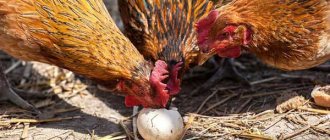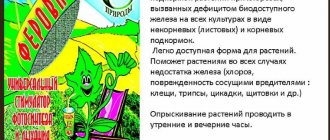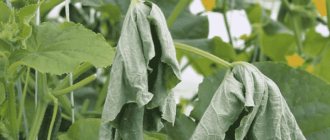The main symptoms of diarrhea in turkeys
Normal turkey feces are dark brown in color and have a dense consistency that looks like oblong pellets. If the stool is liquid, it is considered diarrhea, which in turn is a symptom of pathological disorders in the digestive system.
Diarrhea leads to fluid loss (dehydration), so it is accompanied by the following symptoms:
- weakness and lethargy;
- increased frequency of bowel movements;
- loss of appetite;
- apathetic behavior of the bird;
- drooping wings;
- difficulty getting up on your paws;
- increased feeling of thirst;
- weight loss
As the disease progresses, birds spend more time sitting, cresting and closing their eyes. The plumage becomes dull, dirty lumps form near the cloaca, and feathers fall out. Conjunctivitis develops, the nasal passages and larynx become clogged with mucus, and convulsions begin.
If the entire herd gathers in one heap and the birds press against each other in an attempt to keep warm, this indicates the defeat of all individuals.
Causes of diarrhea and consequences
Young turkey poults are most susceptible to disease - therefore, you need to especially carefully monitor their living conditions and ensure the correct diet. Small turkey poults should be kept separately from young animals of other breeds - they should not be mixed in the same flock with ducklings and chickens. Such measures are taken to ensure that turkey chicks perceive only the flora of their mothers, since microbes from birds of another group can lead to massive loss of young turkeys. Contact within your flock leads to the fact that turkey poults develop their own immunity, which is able to resist diseases.
Diarrhea in turkey poults can be caused by infection with parasites, poor quality food, incorrectly selected or of poor quality. The cause of diarrhea can also be live food that is obtained independently. At the first sign of diarrhea, it is important to find out about the cause that caused it and promptly begin treatment in order to prevent mass death of the bird. If measures are not taken in time, you can not only lose all the chicks, suffering serious losses, but also require complete disinfection of the poultry house from pathogens.
Different types of diarrhea are caused by different pathogens, some of which are fatal, others are almost harmless and go away on their own. You need to know that all types of intestinal disorders are easily treated at an early stage of the disease, so treatment should be started immediately.
Causes of loose stools
There are a number of serious causes of diarrhea in turkeys, but there are also harmless factors that are easy to correct. What causes diarrhea in birds:
- infections – bacteria, viruses, parasites;
- improper diet - too many vegetables, juicy grass, which causes fermentation processes in the digestive system;
- poor quality food, sudden change of food;
- unsanitary conditions, especially with rare litter changes;
- excessive heat or cold;
- increased dryness or humidity in the poultry house, outside;
- taking antibiotics for a long time, against which dysbacteriosis occurs;
- dirty water in the drinking bowl;
- incorrect diet.
If diarrhea occurs in young animals, the cause may be that the grain is ground too coarsely, which disrupts peristalsis.
Associated symptoms of diarrhea
Diarrhea in birds can be accompanied by various symptoms, the combination of which will help the owner determine the cause of the intestinal disorder. Therefore, if you notice loose stools in birds, you need to monitor the livestock.
Along with diarrhea, turkeys may exhibit the following symptoms:
- Refusal of food, as a result of which the birds slow down in development.
- Constant thirst. Diarrhea provokes fluid loss, so turkeys try to make up for the deficiency by regularly running to drinking bowls.
- Depression and apathy. A disorder of the digestive system greatly exhausts the body, so turkeys become lethargic and move little. The plumage of birds becomes dull and feathers fall out.
- Change in body temperature. If diarrhea is caused by an infection, the temperature may drop or increase.
If, against the background of diarrhea, turkeys experience a severe deterioration in their health: cough, paralysis, inflammation, this indicates that the birds require urgent medical attention.
Types of diarrhea in turkeys
The first thing you need to pay attention to when dealing with diarrhea in turkeys is the color of the droppings. By the shade you can understand what caused the diarrhea, how dangerous it is and how you can help the birds before going to the veterinary clinic.
Excrement samples are necessarily collected for laboratory testing, thereby determining the type of pathogen.
Yellow
More often than not, this shade of liquid masses is considered not dangerous. Most often caused by indigestion due to the inclusion of a new food or another type of feed in the diet. But you should not completely ignore yellow feces - this may be a sign of the development of a dangerous Newcastle disease.
In this case, not only diarrhea appears, but also other symptoms:
- apathy;
- decreased appetite;
- staggering;
- difficulty breathing;
- convulsions.
If these signs are not present, it is enough to give the birds a light pink solution of potassium permanganate.
Green
Green diarrhea always indicates an infectious infection of turkeys. These are the following pathologies:
- Coccidiosis. When the disease occurs, bloody spots in the stool, ruffled feathers, and lethargy are noted. As the feces develop, they become dark brown in color.
- Pasteurellosis. The peculiarity of the manifestation is the stringiness of feces, the presence of blood impurities and foam.
- Newcastle disease. Characterized by changes in gait, lack of appetite, and convulsions.
With such lesions, there is a risk of extinction of the livestock from 30 to 100%.
White
White stool is the most dangerous - it indicates paratyphoid fever and salmonellosis. The reason is the bacterial pathogen Salmonella, which is characterized by increased survivability (does not die even at low temperatures).
It is necessary to additionally treat the poultry house with disinfectants.
Mustard
Mustard-colored liquid feces are observed with such an invasive disease as histomoniasis. The causes of development are damage by protozoan parasites, which are localized in the cells of the liver and cecum.
The main signs of the disease:
- increased smelliness from feces;
- swelling;
- blue discoloration of the mucous membranes and skin of birds;
- a sharp decrease in body temperature;
- painful spasms (manifested by a plaintive squeak);
- constant trembling;
- disheveled;
- depressed state.
At the beginning of the development of histomoniasis, light yellow feces are observed, which then acquire a mustard tint.
The infection is spreading rapidly, so action must be taken immediately. For treatment, the veterinarian prescribes Metronidazole. Before going to the veterinary clinic, sick individuals are isolated and the poultry house is disinfected.
Brown
This is not a dangerous symptom. Brown feces occur when new foods are introduced to turkeys, such as eggs. Normal stool is dark brown in color, but with changes in diet, the stool becomes lighter in color.
To prevent this from happening, new foods should be introduced into the diet in the smallest dosages. This will allow the birds’ body to get used to it faster.
Black
Black feces indicate intoxication of the body. Birds can be poisoned by poisonous plants, spoiled foods, grains with microtoxins, low-quality or expired specialized food.
Blackness is caused by digested blood fluid and waste products of pathogenic microorganisms. Blood appears in the gastrointestinal tract due to internal bleeding during inflammatory processes.
Determining the color of stool
Having diagnosed diarrhea in his patients, the farmer must begin immediate treatment.
Abnormal bowel movements in turkeys can signal not only minor digestive disorders, but also serious diseases. Some of them can be fatal to the bird. You can determine how to treat a bird by the color of its feces. In turkeys, feces that are not normal can come in a wide variety of colors.
Brown diarrhea
Brown diarrhea is not fatal. Most often this is evidence of a violation of the regime and food of turkeys
It is also worth paying attention to the quality of the feed. Brown diarrhea in adult turkeys weakens the immune system and can lead to more serious consequences.
During treatment it is worth changing foods
Pay special attention to the cleanliness of the feeders. Dirty troughs and trays can contribute to the rapid spread of infection from the turkey poult to other birds; it is advisable to disinfect them or replace them altogether
Folk remedies will help normalize stool and completely get rid of the disease in turkeys. Here is one of the popular recipes: grind nettle and wormwood in a 1:1 ratio and give it to the birds along with food. It is also worth turning to traditional medicine. Antibiotics of fluorotrichnol origin have proven themselves well. Add them to bird drink in the proportions specified in the instructions.
White diarrhea
If a turkey has white diarrhea, the farmer should take immediate action. Discharge of this color and also bubbling discharge may indicate the development of a serious disease - pullorosis.
Pullorosis is an acute infectious disease that affects both chicks and adults. Accompanied by diarrhea, cowering and squeaking birds. Small turkey poults are especially affected. White diarrhea in turkeys can occur in a hidden form. Therefore, even the disease of one individual should alert the farmer and timely measures should be taken.
Often occurs in poultry populations after reaching three weeks of age. The infection spreads very quickly and can lead to the complete extinction of the flock.
In case of complications or insufficient measures to use decoctions, it is worth starting to use antibiotics. The treatment regimen can be read in the instructions or obtained individually from a veterinarian. The following drugs help against white diarrhea: Furacilin, Sulfadimezin, Levomycetin, Furazolidone, Tetracycline, Erythromycin.
Mustard colored diarrhea
Symptoms of this development of diarrhea may be histominosis or Newcastle disease. The causative agent is a single-celled parasite. Characterized by general weakness and lack of appetite. Next comes immobilization, muscle atrophy - the bird dies.
A course of antibiotics is used for treatment. If the medications are chosen correctly, healing occurs within five to seven days after the start of therapy. Otherwise, the treatment should be reconsidered. To prevent the disease, it is recommended to get the Newcastle disease vaccine.
Yellow-green color
A turkey has yellow diarrhea - what to do in this case? Often yellow-green diarrhea in turkeys is caused by new food. You can give turkeys a solution of potassium permanganate with water three times a day. Repeat the procedure for four to six days. The introduction of new types of complementary foods should be temporarily abandoned.
If birds exhibit weakness and refusal to eat in addition to diarrhea, Newcastle disease may be suspected. The disease develops rapidly; in severe cases, turkeys become paralyzed and die. In order to prevent mass mortality of livestock, vaccinations should be done in a timely manner.
Black diarrhea
Feces of this color can occur in birds during inflammatory processes in the gastrointestinal tract. The cause of the disease is internal bleeding in the stomach of birds, which is why the feces when leaving the body are painted black. Blood clots are a signal for immediate treatment for birds.
You can eliminate the black color of discharge with the help of herbal decoctions: green tea, recognized as a good antiseptic, chamomile. A weak solution of manganese is also good for treating diseases of the gastrointestinal tract.
Give medicinal decoctions to birds throughout the week, several times a day. Activated carbon is also recognized as a good method of treatment. It must be crushed and given to turkeys along with water or liquid food.
Folk remedies
If it is not possible to call a veterinarian or buy the necessary medications, farmers use traditional medicine recipes, but the following measures must be taken before treatment:
- sick birds are selected and removed from the main flock;
- the habitat of infected individuals is thoroughly cleaned - the litter is changed, the room is disinfected;
- all the feed that was available at the time when the sick turkeys were in the common poultry house is replaced;
- to restore the digestive system, activated carbon is added to the feed;
- the amount of liquid the birds drink increases.
What products do turkey breeders recommend using:
- Rice porridge. Boil short-grain rice until it forms a thick consistency. Cool and feed to the bird 2-4 times a day.
- Green tea. The tincture should not be strong, so add 1 tsp to 1 liter of boiling water. green tea leaves, cool until warm, pour into a drinking bowl.
- Nettle decoction. For 1 liter of boiling water, take 7-8 tbsp. l. plants. Put on fire, after boiling, cook for 5-7 minutes. Cover with a lid and leave for 1-2 hours. Strain and give to sick individuals to drink.
- Chamomile tincture. Pour 0.5 liters of boiling water into a thermos, add 4 tbsp. l. herbs. Leave for 3 hours, filter. Add to drinking water until the liquid is light in color.
- Pomegranate peels. Prepare the crusts in advance when raising turkeys. To do this, peel the pomegranate and place it on paper in a dark, warm and dry place. When the peels are completely dry, put them (1 tsp) in a thermos and fill with boiling water (250 ml). Let it brew for 1-2 hours. Add water to birds at the rate of 1 liter of water.
Mustard colored diarrhea
Mustard-colored diarrhea can be thin or even stringy, and it is not the rarest among ailments in young animals. At home, it can be observed in turkeys or young animals from yellow to mustard color. If turkeys are yellow, then this type of diarrhea quickly weakens the young animals and they stop being active. Diarrhea in turkey poults is caused by Newcastle disease and histominosis, which is caused by single-celled parasites.
How to treat diarrhea in turkey poults? If birds are suffering from mustard-colored diarrhea, it is treated with antibiotics, and already on the third or fifth day the young birds become more active. Turkey poults are vaccinated against Newcastle disease, not only small ones, but also adult ones. If a single case of such diarrhea occurs, contact the veterinarian to vaccinate the entire flock to prevent its death.
Intestinal disorders with yellow discharge
When turkeys begin to get sick and have yellow discharge, this is how the intestines of turkey poults react to the intensive introduction of complementary foods - when, apart from diarrhea, there are no other signs of illness, then general measures are taken. Yellow diarrhea, especially at one month of age, is very dangerous. Turkey poults are given a weak solution of potassium permanganate, and the new type of complementary feeding is completely excluded.
It is dangerous when yellow intestinal discharge is combined with Newcastle disease - this combination is so deadly that even vaccination sometimes does not save turkey poults from death. Especially when the yellow discharge and young animals were not vaccinated at a precisely defined time. Therefore, you should contact specialists in time and strictly follow their recommendations, only in this way will the bird recover faster and it will be possible to prevent the mass death of birds and large losses from it.
Professional treatment
In order for diarrhea in turkeys to be treated at a professional level, it is necessary to contact a veterinarian to make an accurate diagnosis and identify the cause of diarrhea. This is due to the fact that for a certain disease, specific treatment regimens and remedies are prescribed.
Diarrhea due to histomonosis
Histomonosis occurs due to infection with histomonas (a protozoan parasite). The infection enters the intestines with food, after which it changes its location - seeps into the bloodstream, mucous membranes and tissues in the internal organs.
The disease is characterized by lethargy and decreased body temperature (maximum 37.9). A distinctive feature is 100% damage to the livestock. If one chick gets sick, all the others become infected. If treatment is started in a timely manner, the mortality rate reaches 70%.
Metronidazole is used for treatment. For 1 kg of body weight of a turkey, 10 mg of medication is needed. For oral administration, the tablet is crushed into powder and mixed with food, given three times a day. You can add the drug to water by dissolving 4 tablets in 5 liters. Duration of treatment is 9-10 days.
Those individuals that have recovered remain carriers of the pathogen, so they are no longer placed with healthy turkeys. However, it is undesirable to use their eggs and meat for food.
Diarrhea due to pullorosis
In its chronic form, the disease practically does not manifest itself, so it is most often discovered by chance. In acute cases, there are the following signs:
- foul-smelling white stool with a runny consistency;
- limited mobility, so turkeys either constantly stand or sit, but always with their paws spread to the sides;
- complete refusal of food;
- frizz;
- half-closed eyelids.
In the severe stage, the cloaca becomes clogged, causing the head to tilt back. Convulsions occur, the birds fall and die.
Treatment is carried out using antibacterial agents - Baytril or Tilan. Since birds completely refuse to eat, the drugs are diluted in water at the rate of 1 ml of solution per 2 liters of water.
The pathogen retains vital activity until the death of the turkey, so it is strictly forbidden to use their eggs for breeding.
Diarrhea with enteritis
There are two types of enteritis in turkeys: viral and hemorrhagic. It is manifested not only by loose stools, but also by the following symptoms:
- blue scallop;
- darkening of the head area;
- depression;
- decreased body temperature;
- anorexia – due to refusal to eat;
- strong chirping;
- brownish-greenish droppings;
- putrid odor from the beak.
Treatment is carried out with antibiotics. For example, Enteroseptol. Additionally, Iodinol is recommended. The dosage is prescribed by the veterinarian.
Elimination of pseudoplague
Newcastle disease has another name - pseudoplague. This is a very dangerous disease that still has no cure. Signs:
- increased body temperature;
- blue scallop;
- swelling of the chest area;
- paralysis of the neck, wings, paws;
- formation of mucous discharge from the beak and sinuses;
- development of conjunctivitis;
- runny nose and cough;
- head tremor;
- problems with movement coordination;
- the appearance of eggs without shells.
Features of liquid feces are yellow, gray or green.
Since there are currently no treatment methods, preventive measures and vaccination are used at the age of the chicks.
Features of diarrhea with enteritis
This disease occurs due to an inflammatory process that has a negative effect on the gastric mucosa.
Infection occurs through dirty water and poor-quality food.
Infection of young livestock with coccidiosis is observed in the summer
Food that the bird has not had time to digest enters the intestines.
The infected individual has no appetite, and fluff sticks together in the anal area. The farmer should place the birds in a separate pen and change water and feed regularly. To protect the entire population, it is recommended to resort to vaccination.
Prevention in birds
The optimal solution for every farmer is to protect turkeys from infection. To achieve this, basic preventive measures are taken. You need to purchase birds from trusted breeders, keep adults separately from young animals, etc.
Diet
The condition of the gastrointestinal tract depends on the food given to turkeys. The diet should consist of the following components in percentage terms:
- grain – 60-65%;
- feed yeast – 3-4%;
- herbaceous plants – 4-5%;
- limestone – 3-3.5%.
To balance the menu, chalk, dry food, sunflower cake, and fish meal are added.
You cannot buy food that has not been disinfected, as it contains various bacteria.
Vaccination
Thanks to timely vaccinations, the risk of infection of turkeys is significantly reduced. The mycoplasmosis vaccine is administered twice - 1 and 3 months after birth.
It is important to vaccinate against pseudoplague. For this purpose, products based on La Sota strains (paramyxovirus, which is the causative agent of Newcastle disease) are used.
Vaccinations are given on the following days after birth:
- at 14-20;
- at 35;
- at 60;
- at 120-125.
If this is not done in a timely manner, the farmer will lose his entire livestock.
Bird hygiene
The best conditions for the proliferation of pathogenic microorganisms are dirt, so you need to adhere to the main sanitary and hygienic rules for keeping birds:
- do not allow excess heat, as bacteria multiply in this environment;
- monitor the humidity level, regularly ventilate the house;
- change bedding at least once a day;
- install feeders outside the cages;
- Change drinking water twice a day or place drinking bowls with dispensers.
If turkeys experience diarrhea, it is important to determine the danger of liquid feces by color, isolate sick individuals, and take fecal samples for examination. This will help provide timely assistance to the birds. The sooner this is done, the less likely it is that other birds will become infected.
0
0
Copy link
Varieties
Let's consider the types of diarrhea, on the basis of which we can determine the cause of the disease.
White
White diarrhea appears in birds infected with pullorosis (avian typhus). Pullorosis is an infectious disease caused by the Salmonella group. The disease affects all species of poultry from the order Gallinae, but is most often found in chickens and turkeys.
A sick individual experiences serious intestinal dysfunction. The wand also enters the liver, kidneys, spleen and ovaries, causing an inflammatory process. If the pathogen enters the respiratory tract, then cold or flu symptoms occur.
Main symptoms.
- Discharge of mucous feces, which clogs the cloaca.
- Impaired coordination of movements.
- Developmental delay.
Note that there are three forms of the disease: acute, subacute and chronic. In the chronic form, the symptoms may be subtle, but this course of the disease causes necrosis of important organs (hearts, liver, muscles), which ends in the death of the bird.
Mustard color
Mustard-colored diarrhea occurs with histomonosis. Histomoniasis is a parasitic infectious disease caused by protozoan microorganisms. The disease affects not only domestic but also wild birds, so the latter can be carriers of the infection.
Initially, single-celled organisms enter the stomach, after which they penetrate the intestines and liver. It is in these organs that it begins to multiply rapidly, causing serious digestive problems.
Foci of inflammation appear, after which tissue damage begins. During their life, microorganisms release large amounts of toxic substances that poison the body.
Main symptoms
- Feces have a mustard-greenish or mustard-brown color, as well as a strong, unpleasant odor.
- Body temperature decreases by 1-2°.
- The skin on the head becomes dark gray or black.
If the disease is in a chronic form, then it is not capable of killing the bird, and the symptoms are not always visible. In this case, a sick bird can infect the livestock, in which the disease will develop in an acute form. Even after recovery, the bird is a carrier of infection.
Yellow color
Yellow diarrhea may appear with a sudden change in food. However, if at the same time the turkey poults become lethargic, and paralysis of the limbs is also observed, then this may indicate Newcastle disease (Asian fowl plague).
Newcastle disease is a viral disease caused by an RNA virus. It affects internal organs, causing bleeding, swelling, and tissue death.
This disease is extremely dangerous, as it leads to damage to the entire population, after which 60% to 90% of the birds die. Death occurs due to simultaneous damage to the respiratory system, central nervous system and gastrointestinal tract. Carriers are both domestic and wild birds. The maximum mortality rate is observed in young animals.
Main symptoms
- Temperature rises to 44°C.
- The cornea of the eye becomes cloudy and conjunctivitis appears.
- Turkey poults refuse to feed.
- Liquid stool is yellow in color with small blood clots.
- Cold symptoms appear.
With the fulminant course of the disease, death occurs suddenly, and is not preceded by any symptoms. The bird simply dies a few hours after infection.
Brown
Brown diarrhea may occur due to the addition of boiled chicken eggs or foods that should not be given to turkey poults. If no other symptoms are observed in the young animals, then it is enough to change the daily menu.
However, if the feces are foamy and have a strong unpleasant odor, then it is worth remembering the disease histomoniasis described above. In case of normal diarrhea due to improper selection of products, turkey poults are treated by adding nettle or wormwood to the feed. This is enough to normalize the functioning of the gastrointestinal tract.
Black
Black diarrhea appears in birds due to poisoning. The stomach or intestines become inflamed, and the integrity of the tissues is also compromised, causing blood clots to get into the stool. They are the ones who turn stool black.
First of all, it is necessary to find out the cause of the poisoning, and then remove the sick individuals. Next, treatment is carried out using various drugs or folk remedies. Also, sick turkey poults are provided with high-quality food that does not overload the gastrointestinal tract.
How to treat diarrhea
The type of therapy depends on the cause of diarrhea and the established disease. If stool disorder appears due to errors in nutrition and care, it is necessary to adjust the diet and improve living conditions. A mandatory condition during treatment is drinking regime.
Basic rules of treatment:
- separate sick individuals from healthy ones to prevent infection of other birds;
- treat the room in which the turkeys were kept with disinfectants. Feeders and drinking bowls must be treated. Keep birds elsewhere;
- to enhance the effect of treatment, enrich the diet with vitamin supplements;
- strictly follow the recommendations of the veterinarian;
- completely change the food;
- provide quarantine for a month.
Drug treatment is prescribed by a veterinarian, taking into account the condition and accompanying symptoms of the birds. Follow the course strictly.
Medicines
Several medications are used to treat diseases with diarrhea in turkeys. Treatment should be combined with a diet, as well as drinking plenty of fluids in the first days.
Tylosin
The drug Tylosin is a broad-spectrum antibiotic with low toxicity. Used to treat poultry of all types. Prescribed for spirochetosis, mycoplasmosis, and respiratory infections. For turkeys, use a 5% solution of the drug diluted with water. It is administered subcutaneously by injection or the prepared solution is added to drinking water. 2-3 g of Tylosin are needed per day per individual. The course of treatment is 7 days, do not combine with other bactericidal drugs.
Eriprim
Broad-spectrum antibiotic Eriprim with a composition similar to Tylosin. Indicated in the treatment of pneumonia, bronchitis, chlamydia, mycoplasmosis. The course of therapy is 3-5 days. Before use, 100 g of the drug is diluted in 100 liters of water and given with food. The prepared solution is stored for two days. When added to drinking water, the dosage is different - 150 g of the drug is added to 100 kg of feed, stored for 8 weeks. After Eriprim therapy, slaughter is carried out only 8 days after the end of treatment.
Baytril
Baytril is an antibiotic that inhibits the growth and development of gram-positive and gram-negative microorganisms. Indicated for the treatment of salmonellosis, colibacillosis, mycoplasmosis, hepatitis. Cannot be used for the treatment of streptococcal infections. Turkeys are prescribed a course of 10% solution with the addition of the prepared solution to drinking water. To prepare, 50 ml of the drug is diluted in 100 liters of water. An increased dose is used for salmonellosis. For one individual, 10 mg of the product is required per 1 kg of bird weight. The course of treatment lasts until the symptoms disappear. Poultry is slaughtered after 11 days.
Iodinol
Iodinol belongs to the group of antiseptics, the composition is based on molecular iodine. The drug is used to treat animals and humans. Used as an antiseptic for external treatment of wounds, for the treatment of enterocolitis, gastroenteritis, dyspepsia, and gastrointestinal diseases. To treat pathologies of the gastrointestinal tract, 1-1.5 ml of the drug per 1 kg of bird body weight is injected orally using a syringe. Dilute the dose with water in a ratio of 1:2. For chicks, a minimum dosage of 0.2-0.3 ml is used. The course of treatment is 2 weeks. The veterinarian can adjust the duration of the course.
Phenothiazine
An anthelmintic drug for the destruction of livestock parasites. It is used for parasitic diseases, except for roundworms. The dosage is calculated based on 0.3-1 g of the drug per 1 kg of body weight for adults. Give the finished product during the day, mixing it with food in a ratio of 1:100. The course lasts 2 days. The drug should not be used to treat infectious diseases.
Piperazine sulfate
An anthelmintic drug for the treatment of parasitic infections in humans and animals. Indicated for ascariasis and amidostomiasis. The composition of the product paralyzes the worms, after which they are excreted in the feces and the animal recovers. Piperazine is available in powder form, which is added to feed in a dosage of 0.5 g of product per 1 kg of weight. To add to water, calculate the required dose for the total number of sick birds. The course of treatment is 2 days or a gentle regimen every other day.
Folk remedies
Traditional methods of treatment include decoctions and solutions for soldering turkeys. These methods are allowed in cases of mild forms of the disease or poisoning with low-quality food.
Methods for treating diarrhea at home:
- oat decoction:
- chamomile decoction;
- a solution of potassium permanganate in small doses (the liquid should have a slightly pink tint);
- a few drops of wine added to water.
All decoctions and solutions have astringent properties and restore intestinal function.
Birds can be treated at home if the diagnosis is accurately established and does not require the help of a doctor.
Black stool
Black diarrhea and similar discharge indicate signs of poisoning, which lead to inflammatory processes in the stomach of turkey poults. Sometimes black stool may contain blood clots, which is a sure sign of gastric bleeding. A sick individual should be immediately placed in an isolated room to be separated from healthy individuals, since black diarrhea is a serious matter at any age of the bird.
Black diarrhea can also be treated with folk remedies. For example, drink the bird with green tea, infusion of medicinal chamomile, nettle and a weak solution of potassium permanganate. After which the medicine should suppress the intestinal infection in adult and young turkeys and predetermine the recovery of turkey poults from black diarrhea. Activated carbon, which is finely crushed and mixed with turkey poults’ drink, also helps to eliminate intestinal upset.
What do you pay attention to when treating different types of diarrhea?
In addition to specific actions for different types of diarrhea, general rules for treating intestinal disorders should be applied. The farmer must adhere to the following recommendations:
- The use of various solutions for drinking turkey poults.
- A complete disinfection of the poultry house is used; infection should be removed from the floor, walls and walking area.
- The condition of the adult and small turkey should be carefully monitored for a month in order to begin treatment on time.
- You should completely replace the food and consult a veterinarian about your future activities.
If signs of an intestinal disorder appear, you should not decide on treatment on your own. This would be unwise because different types of diarrhea are caused by different infections and parasites. The cause of the disease is eliminated by various types of antibiotics; their independent choice not only transfers the disease to the chronic phase, but can become incurable, which will lead to the death of the bird.
Therefore, regardless of visual observations of the bird, you should contact a veterinarian so that he can examine the condition of the birds and prescribe correct and effective treatment. Young turkeys will not only receive full treatment, but also the necessary vaccinations, which gives them the opportunity to reach adulthood. During treatment, chopped eggs should be completely eliminated from the diet of turkey poults. And most importantly, you should not give in to panic and remember that the earlier treatment for intestinal disorder in turkey poults was started, the greater the chance that it will end with their complete recovery.
Therefore, if domestic turkeys suddenly develop an intestinal disorder, you should immediately contact a veterinary specialist and immediately begin treatment. Plenty of drinking should also be ensured, but if, within a few days, the condition of the patients does not improve, then it is recommended to begin treatment with antibiotics. When the owners act in this way, all pets will eventually turn into large and strong birds.
How dangerous is coccidosis?
Coccidosis in adults can occur with virtually no symptoms. Their body can fight off parasites. For young turkey poults, the disease is life-threatening.
Infection of chicks in most cases occurs in the summer. The source of infection may be warm water that the chicks drink from the same drinking bowl. The causative agents of coccidosis can get into the feed.
Coccidia are protozoan microorganisms that cause damage to the digestive system of turkey poults. A sick bird loses its appetite, becomes inactive, and its appearance changes.
The plumage of turkeys with coccidosis becomes unkempt. The disease can be recognized by the intense thirst experienced by sick chicks. You can see traces of blood in the feces of turkey poults.
Control measures
Pullorosis occurs on farms due to non-compliance with husbandry and nutrition parameters. In the event of a disease outbreak, a poultry farm is quarantined. The disease is dangerous for humans, so increased precautions are taken when working with poultry. On unreliable farms, birds are vaccinated.
During an outbreak of Newcastle disease, the poultry farm is quarantined. The bird is immunized. Depending on the number of livestock, the following types of vaccination are used:
- Soldering.
- Intramuscular injection.
- Eye drops.
- Aerosol spray.
To prevent infection with histomonosis, it is necessary to keep turkeys indoors, preventing pecking of earthworms, which are the reservoir of histomonas.
How to determine the cause of the disease by the color of diarrhea
The color of stool helps identify the cause of diarrhea.
White color
White diarrhea is often caused by pullorosis , a chronic infectious disease. In this case, the bird will swear with white or transparent discharge with a mucous consistency.
Turkey poults whose age does not exceed 30 days are susceptible to infection. Ignoring symptoms leads to the spread of infection to healthy individuals, the fatality rate is up to 70%.
It is recommended to treat turkey poults with a weak solution of manganese or chamomile decoction, which must be given to the birds until complete recovery. If this does not lead to a positive result, you should seek help from a veterinarian.
Yellow
Introducing complementary foods can provoke the release of yellow fecal matter.
Yellow diarrhea may indicate Newcastle disease
In the absence of other alarming symptoms, except for yellow droppings, a weak solution of potassium permanganate is used to treat young animals. The provision of new food is also temporarily suspended.
Yellow diarrhea may indicate Newcastle disease, which causes leg paralysis in turkeys.
With this disease, even vaccination is not a guarantee of complete recovery, so you should immediately contact a specialist to obtain an injection schedule.
